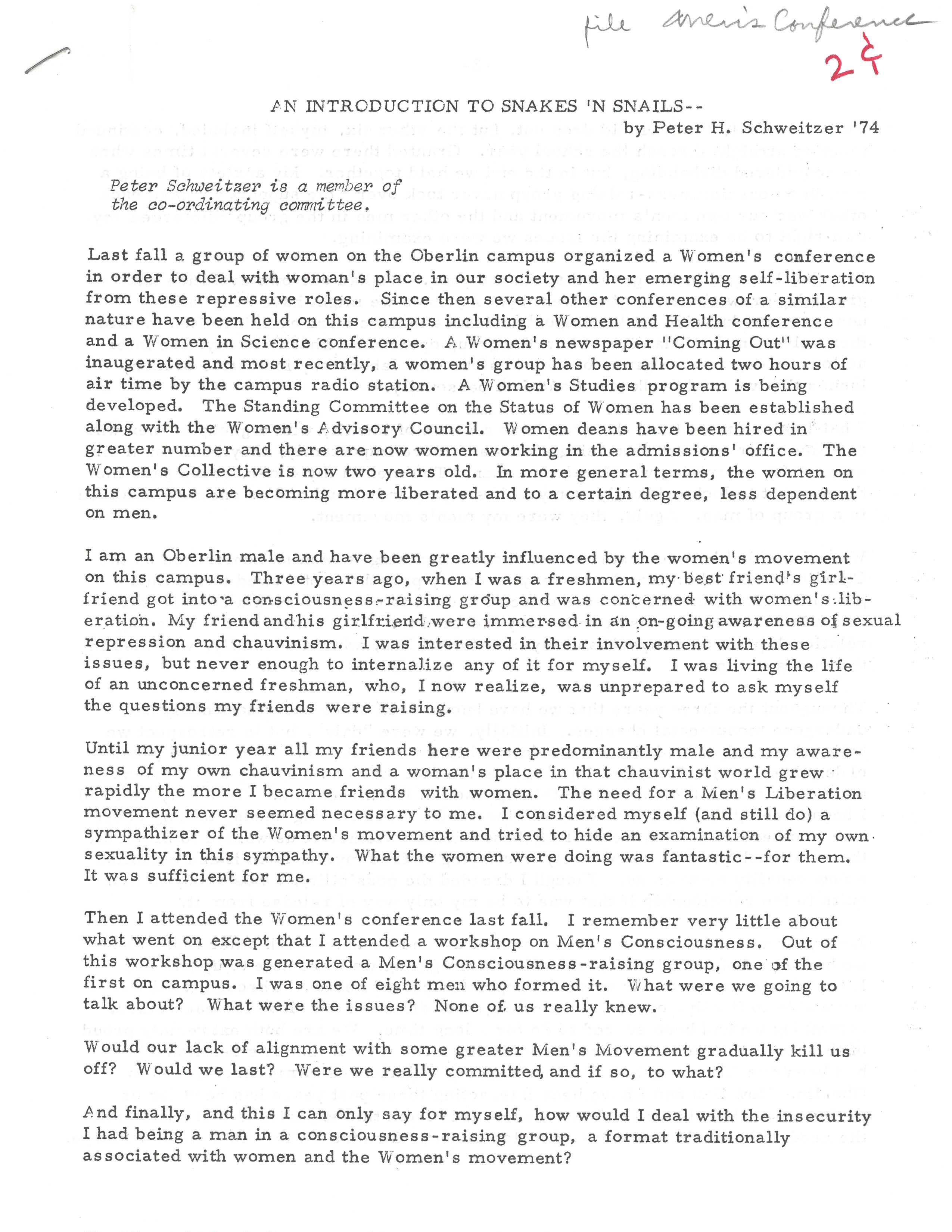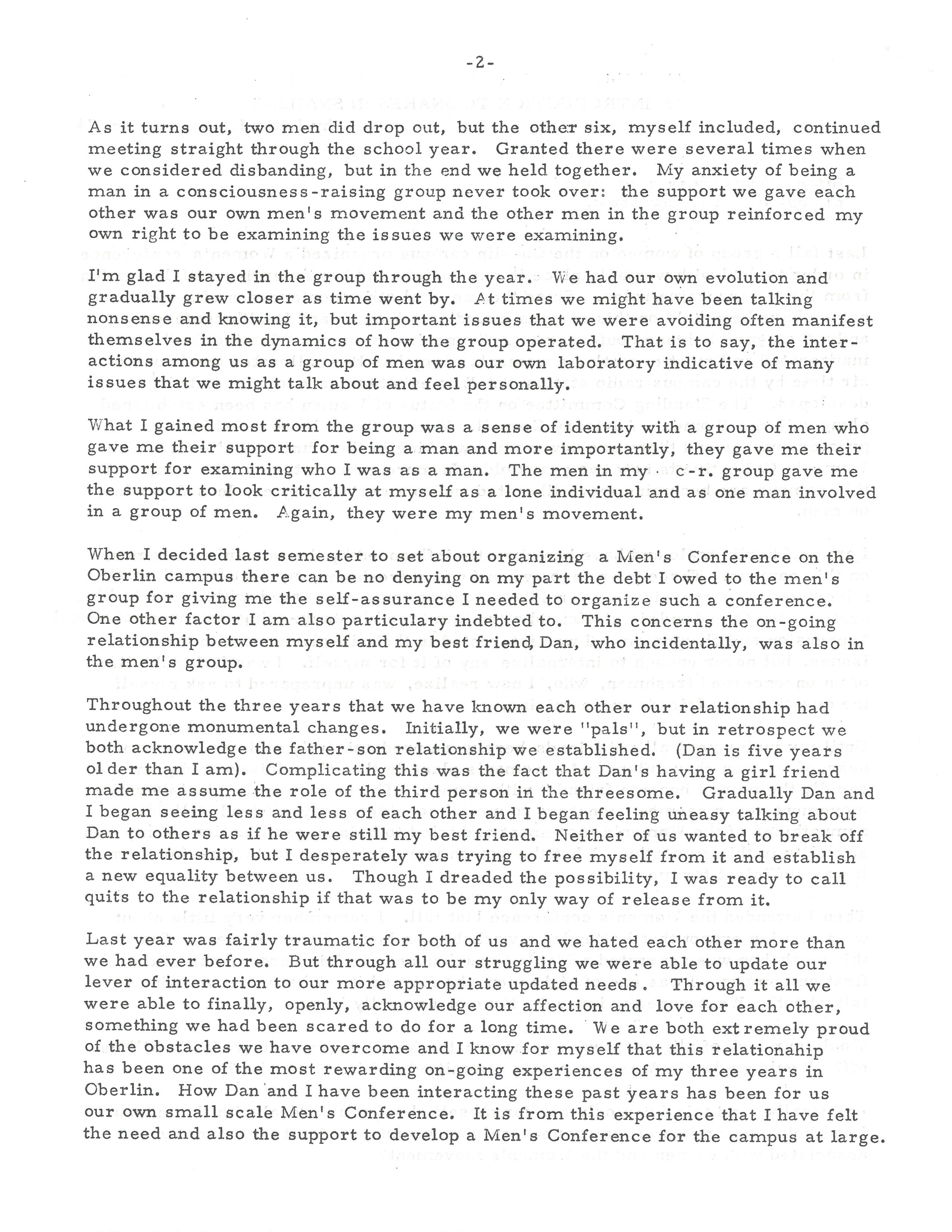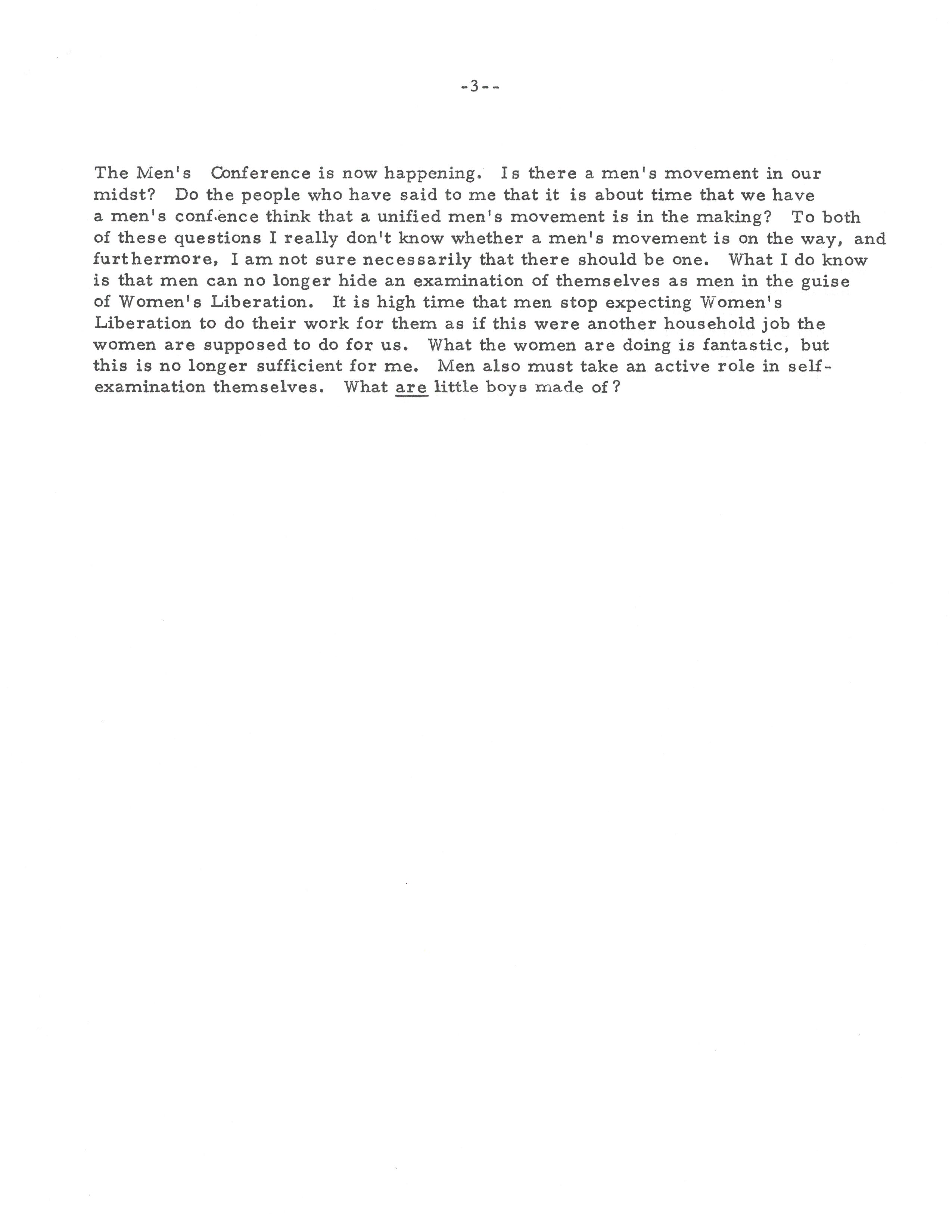|
|
Transcription:
<file Men’s Conference 2 C> AN INTRODUCTION TO SNAKES ‘N SNAILS– By Peter H. Schweitzer ‘74 Peter Schweitzer is a member of the co-ordinating committee. [sic]
Last fall a group of women on the Oberlin campus organized a Women’s conference in order to deal with woman’s place in our society and her emerging self-liberation from these repressive roles. Since then several other conference of a similar nature have been held on this campus including a Women and Health conference and a Women in Science conference. A Woman’s newspaper “Coming Out”[4] was inaugerated [sic] and most recently, a women’s group has been allocated two hours of air time by the campus radio station. A Women’s Studies program is being developed. The Standing Committee on the Status of Women has been established along with the Women’s Advisory Council. Women deans have been hired in greater number and there are now women working in the admissions’ office. The Women’s Collective is now two years old. In more general terms, the women on campus are becoming more liberated and to a certain degree, less dependent on men.
I am an Oberlin male and have been greatly influenced by the women’s movement on this campus. Three years ago, when I was a freshmen, my best friend’s girlfriend got onto a consciousness-raising group and was concerned with women’s liberation. My friend and his girlfriend were immersed in an on-going [sic] awareness of sexual repression and chauvinism. I was interested in their involvement with these issues, but never enough to internalize any of it for myself. I was living the life of an unconcerned freshman, who, I now realize, was unprepared to ask myself the questions my friends were raising.
Until my junior year all my friends here were predominantly male and my awareness of my own chauvinism and a woman’s place in that chauvinist world grew rapidly the more I became friends with women. The need for a Men’s Liberation movement never seemed necessary to me. I considered myself (and still do) a sympathizer of the Women’s movement and tried to hide an examination of my own sexuality in this sympathy. What the women were doing was fantastic– for them. It was sufficient for me.
Then I attended the Women’s conference last fall.[5] I remember very little about what went on except that I attended a workshop on Men’s Consciousness. Out of this workshop was generated a Men’s Consciousness-raising group, one of the first on campus. I was one of eight men who formed it. What were we going to talk about? What were the issues? None of us really knew.
Would our lack of alignment with some greater Men’s Movement gradually kill us off? Would we last? Were we really committed, and if so, to what?
And finally, and this I can say only for myself, how would I deal with the insecurity I had being a man in a consciousness-raising group, a format traditionally associated with women and the Women’s movement.
As it turns out, two men did drop out, but the other six, myself included, continued meeting straight through the school year. Granted there were several times when we considered disbanding, but in the end we held together. My anxiety of being a man in a consciousness-raising group never took over: the support we gave each other was our own men’s movement and the other men in the group reinforced my own right to be examining the issues we were examining.
I’m glad I stayed in the group through the year. We had our own evolution and gradually grew closer as time went by. At times we might have been talking nonsense and knowing it, but important issues that we were avoiding often manifested themselves in the dynamics of how the group operated. That is to say, the interactions among us as a group of men was our own laboratory indicative of many issues that we might talk about and feel personally.
What I gained most from the group was a sense of identity with a group of men who gave me their support for being a man and more importantly, they gave me their support for examining who I was as a man. The men in my c-r. [sic] group gave me the support to look critically at myself as a lone individual and as one man involved in a group of men. Again, they were my men’s movement.
When I decided last semester about organizing a Men’s Conference on the Oberlin campus there can be no denying on my part the debt I owed to the men’s group for giving me the self-assurance I needed to organize such a conference. One other factor I am also particularly indebted to. This concerns the on-going relationship between myself and my best friend Dan, who incidentally, was also in the men’s group.
Throughout the three years that we have known each other our relationship had undergone monumental changes. Initially, we were “pals”, [sic] but in retrospect we both acknowledge the father-son relationship we established. (Dan is five years older than I am). Complicating this was the fact that Dan’s having a girl friend [sic] made me assume the role of the third person in the threesome. Gradually Dan and I began seeing less and less of each other and I began feeling uneasy talking about Dan to others as if he were still my best friend. Neither of us wanted to break off the relationship, but I desperately was trying to free myself from it and establish a new equality between us. Though I dreaded the possibility, I was ready to call quits to the relationship if that was to be the only way of release from it.
Last year was fairly traumatic for both of us and we hated each other more than we had ever before. But through all our struggling we were able to update out lever [sic] of interaction to our more appropriate updated needs. Through it all we were able to finally, openly, acknowledge our affection and love for each other, something we had been scared to do for a long time.[6] We are both extremely proud of the obstacles we have overcome and I know for myself that this relationship has been one of the most rewarding on-going [sic] experiences of my three years in Oberlin. How Dan and I have been interacting these past years has been for us our own small scale Men’s Conference. It is from this experience that I have felt the need and also the support to develop a Men’s Conference for the campus at large.
The Men’s Conference is now happening. Is there a men’s movement in our midst? Do the people who have said to me that it is about time that we have a men’s confe[re]nce think that a unified men’s movement is in the making? To both of these questions I really don’t know whether a men’s movement is on the way, and furthermore, I am not sure necessarily that there should be one. What I do know is that men can no longer hide an examination of themselves as men in the guise of Women’s Liberation. It is high time that men stop expecting Women’s Liberation to do their work for them as if this were another household job the women are supposed to do for us. What the women are doing is fantastic, but this is no longer sufficient for me. Men also must take an active role in self-examination themselves. What are little boys made of?
[Transcribed by Hannah Cohen and Rebecca Debus]. |
[1] At the time of the Conference, Schweitzer was a third-year student at Oberlin College. He graduated in 1974 and is now a Rabbi and social worker in New York City at the City Congregation for Humanistic Judaism. (“Rabbi Peter Schweitzer.” Secular Jewish Ceremonies. Accessed 14 July 2016. Source).
[2] Daniel Fischer, “Men’s Weekend Rates Responses,” Oberlin Review, 5 February 1974, Source.
[3] Robert Christgau, “Are you ready for men’s liberation?” Ms. Magazine, February 1974.
[4] The newsletter was created by women who felt that the Oberlin Review and other campus news sources provided inadequate coverage of feminist issues and events, such as the “Brave New Women” conference (Peggy Kahn, “Oberlin Women’s Issues: Coming out,” Oberlin Review, 11 September 1973, Source).
[5] Schweitzer is referencing the Brave New Women: Society in Transition Conference that occurred 20-22 October 1972 (See documents 1 and 2).
[6] This is referencing a platonic rather than a romantic love, but in general, men at this conference focused a great deal on being able to express their feelings, particularly sentimental ones. After the conference, there was an effort by one of the participants to create a book that summarized the conference and included poetry, personal essays, and art by men surrounding the issue of gender roles. An excerpt from one of the submissions, a personal essay, was printed in The Oberlin Review, and serves as an interesting example of the kind of discourse this conference prompted. The excerpt reads: “Learning about love had been an enjoyably different year long commitment but kissing it goodbye was a one day impossibility. No time to ponder how it should be done; no way to fulfill my own naive beliefs in masculine strength and self control. I turned to Leslie and without thinking did the only thing I could have done and cried. In that shared moment her own tears stopped and she looked incredulously at me, ‘I’ve always known,’ she half-smiled, ‘that I’d know a man really loved me when he cried for me.’ Suddenly it felt good to cry. Sudden- [sic] it was wonderful to be able to weep.” (Fischer, “Men’s Weekend Rates Responses.” Oberlin Review.).


